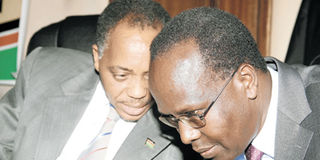Breaking News: Old Kijabe dam tragedy: Death toll rises to 45
MPs face pay cut in proposed plan by Cheserem commission

Finance Permanent Secretary Joseph Kinyua (left) and Commission on Revenue Allocation chairman Micah Cheserem consult at a past event. Photo/FILE
The Commission on Revenue Allocation will recommend sweeping belt-tightening measures which will include lower salaries for MPs, a 14-member Cabinet and moderate spending on infrastructure for the counties in measures aimed at managing the cost of implementation of the new Constitution. (Read: Kenya MPs vote for more pay)
The nine-member Commission has put together far-reaching measures which it says are aimed at preventing the cost of implementation from bankrupting the country.
They will include rationalisation of structures so that governors take over existing buildings to house county governments to avoid the cost of establishing brand new facilities.
“Democracy is expensive, the new structure of governance is top heavy and, if we do not take stringent measures to manage implementation, the public will be the loser,” Commission chairman, Mr Micah Cheserem, says.
Among other things, Mr Cheserem says they will propose that the pay of MPs after 2012 should be lower than current levels and that governors should not waste public funds building new headquarters and residences.
The CRA chairman also points out the need to arrive at a workable solution on the composition of the next Parliament in the light of the one-third gender rule to avoid having a large number of nominated MPs being paid by taxpayers.
Mr Cheserem says politicians running for seats in Parliament and the Senate will have to get used to their new role as legislators and watchdogs for the public with little executive authority over the management of funds at the grassroots.
“The legislature will no longer be a place where you look in the direction of the President for a flag. Parliament or senate will not be a cash cow, it will become the real place to serve the public at a nominal fee,” he says.
The Commission on Revenue Allocation is one of the most powerful organs created under the new Constitution.
The drafters intended it to democratise decisions on revenue allocation to reduce the powers of the old all-powerful treasury which was controlled by the presidency.
Article 216 of the Constitution says the Commission will make recommendations concerning equitable sharing of revenue raised by the national government between the national and county governments.
It will also make recommendations on the financial management by county governments and will have an input on all national legislation involving public finances.
The commission will this month give Parliament the criteria for sharing Sh600 billion collected by the revenue authority in the last year working with indicative figures with an authoritative set of proposals to be offered in December.
In the interview, Mr Cheserem said one of the urgent matters should be debate on how to fulfill the one-third rule on gender representation.
“Ours has been a male dominated society, if they do not change this law, and after elections it is found it is all men in Parliament and Senate, they will not transact business,” he says.
And if that were to happen, the proposed 349 MPs in Parliament will rise to 465 while the Senate’s 68 will go up to 90 – given that they will have to nominate a full third of women.
A constitutional amendment Bill to resolve this is before Parliament but it has met opposition from a section of MPs who accuse the Cabinet of attempting to tamper with the Constitution only a year after it was endorsed.
As part of recommendations for more belt-tightening, the CRA has recommended that the future Cabinet should only have 14 Secretaries (ministers) instead of the prescribed maximum of 22. The current coalition Cabinet has 42.
In counties, the issue of nominations has been sorted out in the Constitution.
However, Mr Cheserem says the Independent Electoral and Boundaries Commission has a challenging task to come up with a formula for carving out wards that will not burden taxpayers.
A task force headed by Dr Mutakha Kangu had recommended at least five per constituency.
This means that Kakamega with the highest number of constituencies in the country will have a minimum of 45 elected councillors while Lamu with two will have only 10.
Mr Cheserem says voters will have to make their choices wisely and pick leaders of integrity to manage the devolved funds.
“If you do not elect a governor of integrity and put in a man or a woman with the old ‘it is my turn to eat’ mentality, you will have lost all the benefits that the drafters of the Constitution envisaged,” he says.
“Let men and women who will become the first presidents of their regions delete from their mind this notion that the post will come with jobs for relatives and supporters.”
Instead, they will be required to maintain a lean government to avoid the past practice where all money went to salaries.
And there will be no money to put up new infrastructure in the counties before their governments are installed.
Instead, Mr Cheserem’s team has recommended that the new governments use existing ones.
For instance, the residence of the Provincial Commissioner should be converted into a State House for the governor while the District Commissioners’ facilities will also be converted for use by the governors.
“These people (PC, DC) who appear reluctant to wake up to realities of the new Constitution are living in the past,” he says.
Mr Cheserem also revealed that the CRA will have to be consulted on how proceeds from natural resources will be used.
For instance, CRA will be making recommendations on how proceeds from the exploitation of coal in Kitui and titanium in Kwale will be used in future.
“We do not want another Ogoni in Kenya,” he says in reference to the poverty in a sea of riches in Nigeria’s oil delta.




